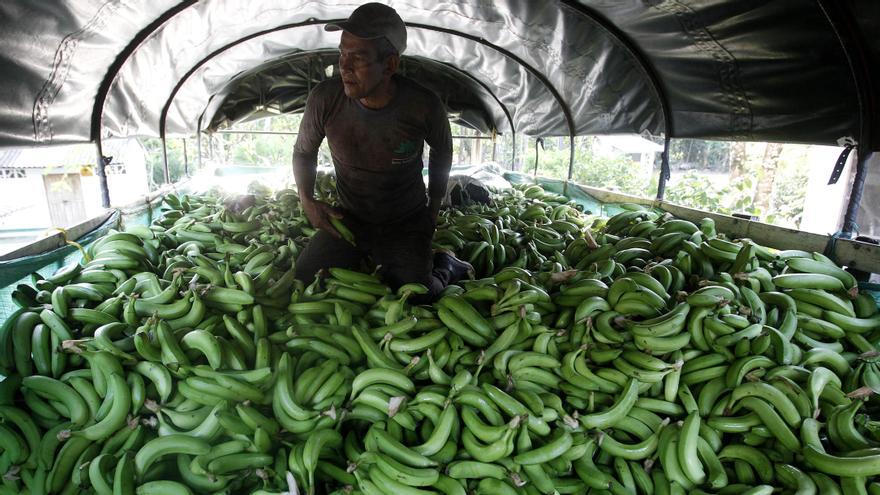The Argentine writer and journalist Roberto Herrscher has just published in Colombia ‘Banana Chronicles’, a book that reviews the unfortunate history of the United Fruit Company in Latin America and provides a vision in various dimensions of the banana world, its workers and its incorrigible companies
–
As stated by Roberto Herrscher in his ‘Banana Chronicles’ (Tusquets Editores), it is possible that an apple was not the fruit of original sin, but a banana. The Argentine author quotes the American Dan Koeppel, who in another book dedicated to these issues, ‘Banana’, suggests that the leaves that clothed Adam and Eve when they discovered the modesty of nudity they are convincing proof. “’Fig leaves,’ the Judeo-Christian tradition calls them,” Herrscher writes, “but ‘fig’ was the word for banana at the time of the Torah. And no one can cover their shame with fig leaves … or apple leaves. However, the large, flexible banana leaves would work perfectly for that need ”.
The devilish company
Writer, journalist and teacher of journalists, Herrscher has published a volume fruit of more than 10 years of work focused on the sad history that has surrounded the banana in Latin America –There where it was politics, revolutions, exploitation and damage–. The book, currently available in Colombia, Argentina and Chile, culminates a long and rigorous investigation that included visits to privileged archives, interviews with former banana workers and a field work that provides perspective on the current situation. Plus a personal part. A few acronyms run through most of the book, of course, UFCO, which identified the diabolical company par excellence: the United Fruit Company.
The Colombian massacre
It is known as the ‘banana massacre’ the killing of banana workers Perpetrated by the Colombian Army between December 5 and 6, 1928 in the Caribbean municipality of Ciénaga. Officially 1,800 workers died. Some sources pointed out more. More than 25,000 employees of the United Fruit Company and subsidiaries had started one of the biggest strikes in banana history on November 28, with a list of requests involved that today almost anyone would consider reasonable. But it was 1928, it was Latin America and it was, surely, a banana republic (an expression whose genesis Herrscher traces in his book). The Army intervened and many years later the bloody episode ended up being part of the ins and outs of ‘One Hundred Years of Solitude’, that is to say, of universal literature.
Mental dependency
Asked by the evils brought by large companies from bananas to Latin America, Herrscher explains: “I think that the substance is summed up in one word that is ‘dependency’: the dependency that gives everything for nothing. I am referring to what it meant to hand over the territory to the companies, yielding to all its conditions, practically give them the land, put at their service a very cheap labor force and guarantee them zero or practically zero in terms of labor rights, something that happened with the UFCO and with other companies in sectors such as agriculture, livestock or mining. Because, at the end of the day, what it created was a mental dependency, that of believing that the only one who has the ability to exploit natural resources is the outsider. A hundred years later that mentality persists, and it does not have to do only with the American company, nowadays it can be the Chinese company or the Spanish company “.
Bananero, a surname
There are multiple ways to understand the importance of the banana in the recent history of Latin America, and one of them – this is playful – is to trace everything that ended up acquiring the surname of ‘banana’. Of course, and to begin with, there is the banana republic (“Where does the expression ‘banana republic’ come from?” Herrscher writes. And he answers: “It is the work of William Sydney Porter, the great goldsmith of the American tale, known by the pseudonym of O. Henry.” Historians and linguists, explains later, they consider that it was in his novel ‘Cabbages and kings’ where the expression was used for the first time). Then there is, of course, the banana novel, whose best-known expression is the banana trilogy of Miguel Ángel Asturias (‘Strong Wind’, ‘The Green Pope’ and ‘The Eyes of the Buried’), but whose “best and most influential example”, according to Herrscher, is the ‘Mamita Yunai’ by the Costa Rican Carlos Luis Fallas. To end banana tourism, which seems to be currently booming (banana workers, children, trains, boats and unions, among others, are taken for granted).
The banana hero
What characterizes a banana novel? “Many banana novels,” Herrscher explains, “have the traditional hero’s journey structure. That hero is usually the banana worker or unionist seeking justice and a sense of themselves, and one of the enemies they meet along the way is the banana company. In his confrontation with her, the hero, the typical poor Latin American finds himself with his own destiny. So the banana is the excuse. For me, the banana novel is in the same category as the novels that in all parts of the world represent the people’s struggle for their identity and their liberation ”.
Infamous practices
During the exploitation of Latin American bananas by UFCO and other US companies, infamous practices took place such as the use of agrochemicals banned in the US for its effects on health. It was the case of the nemagón, which caused havoc among the population of Costa Rica and Nicaragua. Which, according to Herrscher, shows in what regard these companies had the lives of the inhabitants of the tropics. “For them they were human beings of the second or third category, and in that sense it was not a moral problem to use agrochemicals lethal to health. Wild capitalism only respects the limits imposed by law, otherwise it has no limits. Interestingly, what marked the end of the UFCO monopoly had nothing to do with their attacks against human rights, democracy or the environment, but with its breach of US antitrust law. What the US laws protected were the rights of other US companies ”.
Tropical cruises
The banana boats were pioneers of today’s popular Caribbean cruises. Who would have guessed. “They were fast ships because they had to transport perishable fruit in the shortest possible time, and that is why they were preferred by Latin American landowner classes to travel to the United States,” says Herrscher. As the brochures of the time explained, To combat the Caribbean heat, passengers only had to “open a screen that communicated with the refrigeration system that kept the bananas in the hold. The icy air that slowed the ripening of fruits It also made the climate in the cabins more bearable ”.
Five hundred prostitutes
In a conversation with the Costa Rican Carlos Arguedas, former banana worker and trade unionist –A trade unionist from the time when the unions had something to say in the world of bananas–, this tropical, banana and priceless scene comes to light: “I was going from San José to Valle de la Estrella on that train,” Arguedas tells him to the author. “Life there was another world. On payday, every fortnight, a train of prostitutes would arrive. There were four hundred, five hundred to expand into twenty-one farms. Banana farms where there were about six thousand or seven thousand workers, without women, like prisoners in the potholes… ”. Next, Arguedas links memories: “I read in a banana novel that they had a lemon that they used to get out of the girls’ attention as a preventive measure … “” That lemon burned! “
Backward areas
The areas where bananas once brought prosperity nowadays they are deserts, poor areas, backward and lifeless. The reason, Herrscher points out, is that the banana companies operated according to structures that created “absolutely dependent” workers. “They gave them work, they gave them a house, they gave them everything. They were trained to work bananas, to live on bananas, and nothing else ”. The banana worker lived in a closed system outside of which there was nothing, so that when the company left, they not only took their work, but their life. “Mental dependency is the banana mentality. A good part of the problems of Latin America can be understood with this banana mentality ”.
David and Goliat
Despite the excesses perpetrated by banana companies in Latin America, there is a profuse literary trend aimed at its mythologization, especially in the US. And it is not a question of blindness: it is a question of point of view. “In the banana novels there is an unequal struggle between Goliath, the big banana company, and David, the workers, who try to fight it with the few weapons at their disposal. On the other hand, in the account of the North Americans, the company was David, and the monster, Goliath, was nature, the hostile nature of the tropics. The myth of the company came from its determination to tame the terrible tropical nature, and in that story the workers were like a need that created hives, like the mosquitoes that annoyed them in their Homeric combat. I found it very interesting and dramatic that each one saw himself as the hero of his own war, and that they were two different wars ”.
Related news
Little and silly
Have things changed? Chiquita Brands, the successor to UFCO and the main banana distributor in the US today, had to admit in the 2000s that had paid 1.7 million to Colombian paramilitary groups for the protection of its workers. She was also denounced by several NGOs for violating the rights of workers in that country. In Costa Rica they are currently working with the NGO Rainforest Alliance, which certifies the good practices of its banana farms, but other organizations they denounce this alliance as a facelift, and Herrscher himself, who had the opportunity to visit a certified farm where he found the existence of irregularities, is skeptical about it. Poor banana. The years go by centuries change and he remains in the middle of the hurricane. The tropical and the other. It seems born to be controversial.
– .

:quality(80)/cdn-kiosk-api.telegraaf.nl/819cb74a-6fc3-11ec-b271-02d1dbdc35d1.jpg)
